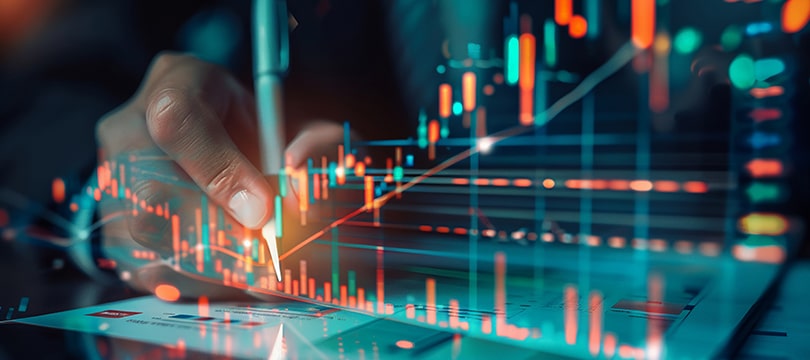In the complex world of forex trading, understanding
the forces that drive the market is essential for developing successful strategies. Among the most effective tools for navigating the forex market is the analysis of market cycles.
These cycles conceal fundamental dynamics that, if thoroughly understood, can provide a competitive advantage. Let's discuss them here.
What are market cycles
Let's start with the basics, namely a definition of
market cycles. This term refers to
repetitive phases of ups and downs in financial markets, characterized by changes in prices, trading volumes, and general economic conditions.
Each cycle follows a pattern that reflects the interaction of various variables, such as
supply and demand, investor confidence, and economic policies.
In particular, in the forex market, these cycles are often driven by macroeconomic factors like inflation, interest rates, and political stability, which influence currency performance.
Here's an overview of the factors that govern market cycles.
- Prices. Variations in currency values.
- Trading volumes. The intensity at which transactions occur.
- General economic conditions. Macroeconomic and geopolitical factors that impact the market.
Why market cycles are important for forex traders
For forex traders, understanding market cycles is crucial, as they provide critical indications of potential future price directions. Currencies, like any other asset,
follow cyclical trends that reflect the evolution of the underlying economies. For example, when an economy is in an expansion phase, its currency tends to strengthen, while in a recession phase, it tends to weaken.
Identifying
the exact point where a market is within a cycle helps traders discern when to buy or sell a currency. This is fundamental in a market like forex, where volatility can present both risks and opportunities.
The ability to recognize a cycle in advance allows traders to position themselves correctly, reducing the risk of losses and
maximizing the probability of success.
How to leverage market cycles
To make the most of market cycles, it is necessary to adopt a strategy based on observing and analyzing economic and technical data. Here are some suggestions for integrating market cycles into your trading decisions:
- Technical analysis oriented towards market cycles. The use of technical analysis is not exclusive to employing market cycles. However, it should be conducted also from this perspective: that is, with the aim of identifying recurring patterns, such as the formation of peaks or troughs that mark potential trend reversals.
- Economic data. Monitoring economic releases, such as reports on GDP, employment, and interest rates, to understand the impact on market cycles is the most important activity for those who want to use economic cycles as a lever, as a key to understanding the present and future of currencies.
- Currency correlations. Analyzing the correlation between currencies to understand how the strength or weakness of one currency may influence another within a cycle. Very often, as the cycle changes, the intensity of a correlation also changes (rarely or almost never does the sign change).
But let's give a practical example.
Suppose a trader is observing the evolution of the euro against the dollar (EUR/USD). After a period of economic expansion in the Eurozone, the trader notices that the euro has reached a peak and macroeconomic data are beginning to signal a slowdown. Using technical analysis, the trader identifies a distribution phase in trading volumes, a signal that the market cycle could shift from a bullish to a bearish phase. In this context, the trader may decide to
sell the euro and buy the dollar in anticipation of a future price decline.
Psychological tips for making the most of market cycles
Trading based on market cycles requires not only technical skills but also solid
mental preparation. We're certainly not talking about the most stressful strategy, but it's also true that cycles don't guarantee certain results.
Therefore, even in this case, the trader's
behavior in the face of fluctuations can make the difference between a winning trade and a significant loss. Facing the dynamics of cycles with mental clarity is essential to avoid impulsive or emotional decisions. Here are some practical tips for maintaining psychological balance during trading.
- Don't get carried away by enthusiasm if some data appears positive. It's easy to get swept up in optimism when some indicators seem to suggest a profit opportunity. However, an overly optimistic outlook can lead to overlooking imminent risk signals. Prudence is key: even in an apparently favorable cycle, every decision must be based on thorough and rational analysis, not on hopes and feelings.
- Account for errors. Even the most experienced traders make mistakes. Market cycles, while useful, can produce false or difficult-to-interpret signals. Accepting that losses are part of the trading journey is crucial for maintaining focus. After all, it's precisely the ability to react to errors with serenity, without being overwhelmed by discouragement, that distinguishes successful traders from those who fail.
- Don't rely solely on market cycles. Cycles are a powerful tool, but they shouldn't be the only guide for trading decisions. Relying exclusively on them can lead to incomplete assessments. It's essential to combine cyclical analysis with other practices, such as fundamental and standard technical analysis, to have a more comprehensive view of the market.




